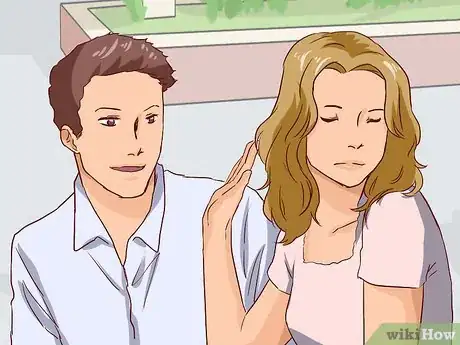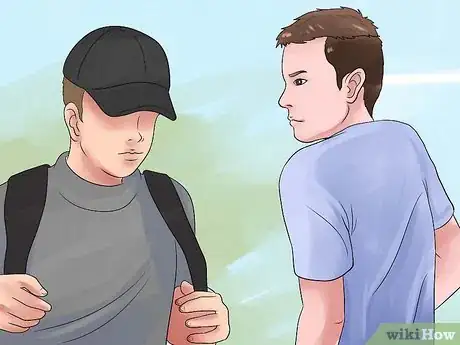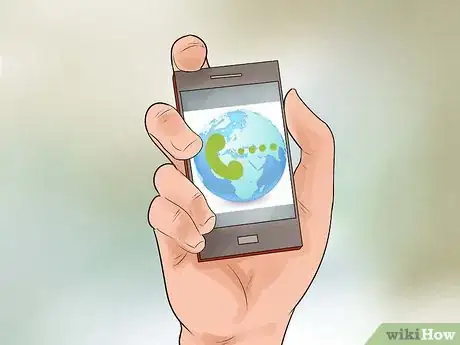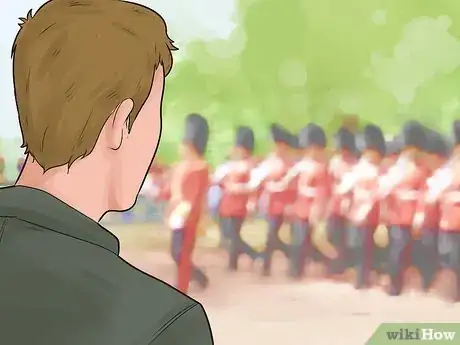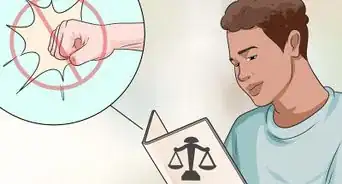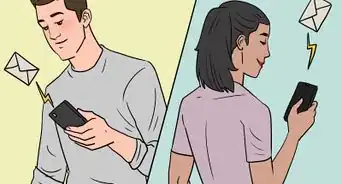This article was co-authored by Leslie Bosch, PhD. Dr. Leslie Bosch is a Developmental Psychologist, National Board Certified Health and Wellness Coach, and Owner of Bosch Integrative Wellness. With over 15 years of experience, she specializes in providing stress relief coaching services to individuals and groups using a variety of scientifically proven methods for change including motivational interviewing, positive psychology, self-compassion, non-violent communication, social learning theory, and self-determination theory. Dr. Bosch received training from the Andrew Weil Center for Integrative Medicine at the University of Arizona and earned a PhD in Human Development and Family Studies from The University of Arizona. She is also a member of the National Board of Health and Wellness Coaching Association. Dr. Bosch has published many papers and been featured in the media numerous times.
There are 12 references cited in this article, which can be found at the bottom of the page.
wikiHow marks an article as reader-approved once it receives enough positive feedback. In this case, 100% of readers who voted found the article helpful, earning it our reader-approved status.
This article has been viewed 79,023 times.
Avoiding attention is not difficult. Being low-key is fairly straightforward in various social situations. Regardless of the location, if you are trying to remain calm around someone who makes you nervous, or if you want to avoid attention by assimilating into a group setting, or even if you want to steer clear of someone entirely, you can avoid attention by following a few simple steps.
Steps
Fitting In
-
1Conform to common attire. Mimic the style of the people around you. Similar to a group of soldiers, football players, or fireman, identifying an individual is difficult because they are all dressed alike. Aim to fit in with clothing choices around you.[1]
- A great way to blend in and build rapport or trust within your community is to copy their behaviors and ways of doing things.[2]
- Adapt to your environment by bringing a reversible jacket or a different colored undershirt for multiple options. Change color like a chameleon and fit into your surroundings.[3]
- In a general setting without a like-minded group, aim for the middle-ground. Somewhere between the tightest and loosest clothes, between the brightest and most muted colors. Find a happy medium between neatest and sloppiest. Make sure if someone were to describe your appearance they'd also be describing several others in the group.
- Wear what others are wearing. The way we dress and say a lot about wanting to attract attention or not.[4] People in specific locations and climates dress to their needs and local fashion. Find the trends and fashion most popular in your area and start fitting in.
-
2Do what others do. Try to imitate the speech patterns, common lingo, and behaviors where you live. In other words, adopt local customs. If everyone in your area says, “Hi y’all!” as a normal greeting, practice your twang.
- In many Europe locations, for instance, counting on your fingers begins with the thumb. Therefore, if you want two of something, start with the thumb and then the index finger.[5]
- Be comfortable even if someone is in your personal space. In Korea it's normal for male friends to physically be very close to one another. Personal space may be respected in America, but in some cultures it's not treated the same way. In Korea it's not uncommon for friends to hold hands, sit together closely, and be much closer than traditionally acceptable to Westerners.
Advertisement -
3Be mediocre. Avoid being the outright winner or loser of anything. While somewhat unhealthy to purposely throttle yourself, you certainly won’t gain notoriety for being average in every way possible.
- If you are finished with a test in class before anyone else, wait until others finish before putting your pencil down and leaving the room.
- When walking in a group of people, aim to be in the middle of the pack. If you're leading everyone is going to notice. If you're dragging behind, pick it up and get ahead of some people.
- Avoid being in charge. Authority is often despised, and rebellion to it is even part of our psychological makeup.[6] Even when marooned with several strangers, it's important not to be seen as an authoritarian or as the person controlling affairs.[7]
Managing Your Surroundings
-
1Keep to yourself. One sure-fire way to avoid attention is to simply avoid interaction with others. There is a fine line, however, between keeping to yourself and being “Comstockian,” which is when people gain attention while trying to avoid it.[8]
-
2Adjust to your location. Think about who will be where you are going, what they will be wearing, how they will be acting, etc. This will help you decide how to best blend in with the people populating the area.
- If going into a business environment, find out if it’s a business-casual or business dress, and then dress appropriately.
- Dress in team colors if you’re going to be at a sporting event, but make sure you aren’t in the front row. You don’t want to end up on the jumbotron where extra attention could blow up in your face.[9] You can even plan ahead for some sporting events and get tickets with less camera visibility.
- Learn the appropriate actions at an unfamiliar event. If going somewhere for the first time, know the customs beforehand. For instance, applause during movements is frowned upon during classical music.[10]
-
3Assimilate to event or location expectations. Learn team cheers, order the right drinks, speak the current lingo.[11] Try to imagine what you look or sound like from other people's view, and work with that knowledge.
Manage Your Interactions
-
1Minimize your actions. Do what everyone else is doing, but to a lesser degree. If everyone is laughing, chuckle; if everyone is crying, shed a tear. The key is to be subtle in all your actions.
-
2Unplug from electronic communication. By not replying to others, you’ll avoid their current attention. Further, your lack of reply may likely cease other correspondence.
- Turn off your cell-phone. Avoid calls and texts the same. Set your voicemail to let everyone know you’ll be out of the loop for a while. Let emergency contacts know where you’ll be and how to reach you otherwise.
- Don’t check your personal email. Work email may be unavoidable, but personal email can wait. Set an “out of office” auto-reply, or pretend you’re on vacation.[12]
- Log out of social networks. No tweets, snapchats, or facebook messages. Imagine you are trying to avoid revealing a show’s cliffhanger secret or the final score spoiler.
-
3Keep personal interactions to a minimum. Try to avoid eye contact so people aren’t prone to engage you. Lack of eye contact signals inattentiveness and lessened interest.[13] Try not to initiate conversation with anyone. If someone initiates with you, be polite but abrupt. Make it clear you wish to be left alone.
Coordinating Travel
-
1Travel during non-peak times. Many mass-transit options provide their down times. Take advantage of this and try to minimize the number of people you may encounter.
-
2Continue moving. When you are not in the same place very long there will be less time for people to notice you. Some studies suggest dissimilar movement hinders communication between two people.[14] If you are at a crowded social gathering, casually walk from place to place as if you are trying to get somewhere.
-
3Take shortcuts. If there is an alternate route to your daily routine, a less-populated pathway, attempt to literally choose the road less traveled.
-
4Alter your travel patterns. A common security measure for someone under surveillance is to change up their travel routing. Try making a few small adjustments so that people who may be looking for you can’t peg down your whereabouts.
- Leave your house at a different time each day. It’s unlikely someone will wait extraordinarily long if you don’t leave at a consistent time.
- Change your route to normal daily locations. Try the interstate one day, side roads the next. The key is to make it more difficult for someone to perpetually be where you are.
- Make unexpected stops. Try going to a quiet library or coffee shop periodically. Go somewhere out of the ordinary on a whim. Be unpredictable so you are an unknown to those around you, and difficult to find for those who know you.
Expert Q&A
-
QuestionHow do I stop seeking someone's attention?
 Supatra Tovar, PsyD, RDDr. Supatra Tovar is a Licensed Clinical Psychologist (PSY #31949), Registered Dietitian, Fitness Expert, and the Owner of Dr. Supatra Tovar and Associates. Dr. Tovar has worked in the fields of health education, clinical dietetics, and psychology. With over 25 years of holistic wellness experience, she practices Holistic Health Psychotherapy. She combines her psychology, diet, and fitness knowledge to help those struggling with depression, weight gain, eating disorders, life transitions, and relationships. Dr. Tovar holds a BA in Environmental Biology from The University of Colorado Boulder, an MS in Nutrition Science from California State University, Los Angeles, and a PsyD in Clinical Health Psychology from Alliant International University, Los Angeles.
Supatra Tovar, PsyD, RDDr. Supatra Tovar is a Licensed Clinical Psychologist (PSY #31949), Registered Dietitian, Fitness Expert, and the Owner of Dr. Supatra Tovar and Associates. Dr. Tovar has worked in the fields of health education, clinical dietetics, and psychology. With over 25 years of holistic wellness experience, she practices Holistic Health Psychotherapy. She combines her psychology, diet, and fitness knowledge to help those struggling with depression, weight gain, eating disorders, life transitions, and relationships. Dr. Tovar holds a BA in Environmental Biology from The University of Colorado Boulder, an MS in Nutrition Science from California State University, Los Angeles, and a PsyD in Clinical Health Psychology from Alliant International University, Los Angeles.
Licensed Clinical Psychologist (PSY #31949), Registered Dietitian, & Fitness Expert Licensed Clinical Psychologist (PSY #31949), Registered Dietitian, & Fitness ExpertExpert AnswerUsually, when people seek out attention, it is because they are unsure of themselves and need some external validation about their self-worth. Learning how to cultivate your own self-worth can be a helpful way to avoid grabbing the limelight for validation. Here are a few tips on how to do that. Change your thoughts, if you are thinking, “I am unworthy,” or “I am nothing without attention,” you can challenge those thoughts. Changing your thoughts to something healthier can help you when you are reaching for external praise. Find personal satisfaction in what you are doing. Recognizing your own efforts as vital steps toward achieving your life goals can increase personal satisfaction and decrease the need to seek praise outwardly.
Licensed Clinical Psychologist (PSY #31949), Registered Dietitian, & Fitness ExpertExpert AnswerUsually, when people seek out attention, it is because they are unsure of themselves and need some external validation about their self-worth. Learning how to cultivate your own self-worth can be a helpful way to avoid grabbing the limelight for validation. Here are a few tips on how to do that. Change your thoughts, if you are thinking, “I am unworthy,” or “I am nothing without attention,” you can challenge those thoughts. Changing your thoughts to something healthier can help you when you are reaching for external praise. Find personal satisfaction in what you are doing. Recognizing your own efforts as vital steps toward achieving your life goals can increase personal satisfaction and decrease the need to seek praise outwardly. -
QuestionMy friends told me I was an attention seeker and now they hate me. What do I do?
 Community AnswerMove on and find new friends. Don't give them the satisfaction of toning down your personality just for them.
Community AnswerMove on and find new friends. Don't give them the satisfaction of toning down your personality just for them. -
QuestionWhat should I do if I'm in a very crowded place (like school) but I don't want to be noticed very much?
 Community AnswerRead a book in a corner, or walk close to the wall. Try not to talk as much to people.
Community AnswerRead a book in a corner, or walk close to the wall. Try not to talk as much to people.
References
- ↑ [v162135_b011]. 27 September 2022.
- ↑ [v162135_b011]. 27 September 2022.
- ↑ http://www.thenakedscientists.com/HTML/questions/question/2634/
- ↑ [v162135_b011]. 27 September 2022.
- ↑ http://www.businessinsider.com/order-a-beer-like-a-german-2014-3
- ↑ https://www.psychologytoday.com/blog/surviving-your-childs-adolescence/200912/rebel-cause-rebellion-in-adolescence
- ↑ http://www.npr.org/sections/monkeysee/2012/02/15/146916875/a-nerds-guide-to-what-jeff-probst-wont-tell-you-how-to-win-survivor
- ↑ http://bigthink.com/insights-of-genius/getting-attention-by-avoiding-attention-14
- ↑ http://www.businessinsider.com/ohio-state-fan-espn-2015-1
- ↑ http://articles.chicagotribune.com/2012-05-29/entertainment/ct-ent-0529-applause-during-performance-20120529_1_clap-classical-music-cso
- ↑ http://www.independent.co.uk/news/world/australasia/seven-tips-for-refugees-on-living-in-australia-from-the-government-plus-the-lingo-10496550.html
- ↑ http://blink.ucsd.edu/technology/email/tasks/out-office-2010.html
- ↑ http://msue.anr.msu.edu/news/eye_contact_an_introduction_to_its_role_in_communication
- ↑ http://www.ncbi.nlm.nih.gov/pubmed/25045902



